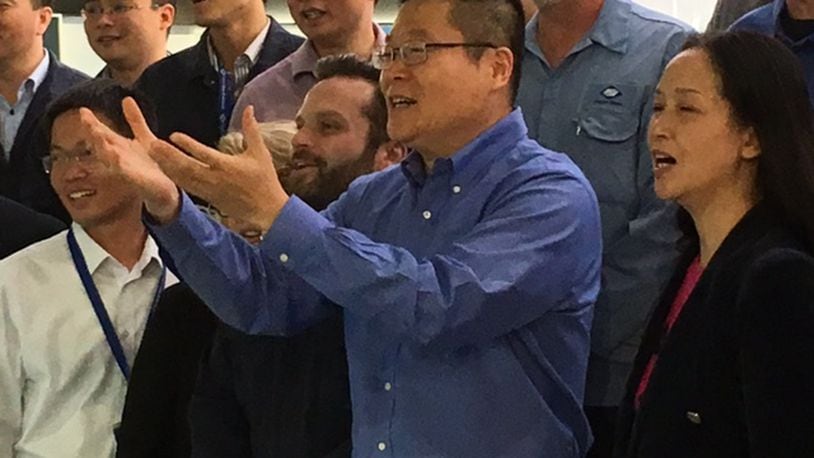“I have nothing to say since it is not true statement and misleading translation in the film,” Liu said in an email to the Dayton Daily News Monday.
The scene in the documentary shows Liu speaking in a private meeting at Fuyao with company founder Cho Tak Wong in 2016 or 2017. At the time, company leaders were concerned about a United Auto Workers campaign to persuade Fuyao workers to approve a UAW-represented bargaining unit. Company workers rejected UAW representation in a November 2017 plant vote.
RELATED: Fuyao president talks of firing UAW supporters in 'American Factory'
According to subtitled translations in the film, Cho says he will close the Moraine plant if workers create a bargaining unit. Cho also says that continued “bleeding” of money at the plant is “worse than a union.”
“American Factory” is the work of Yellow Springs-based filmmakers Steve Bognar and Julia Reichert. It begins streaming Wednesday on Netflix.
Bognar on Tuesday said he and Reichert stand by the translations subtitled in the work. He said further that Liu expressed no misgivings about the subtitles when he saw the film before its public premiere in Dayton Monday evening.
“We went through a rigorous process with multiple translators to do the translations,” Bognar said.
The translators worked independently of each other. At one point, two of them reviewed every line of the film together and “quizzed each other about the accuracy of the translations,” Bognar said.
“We feel clear and good about everything that’s in the movie,” he said. “We feel they’re accurate. We went through quite a process.”
Firing workers for supporting or assisting a unionization effort is considered a civil violation of the National Labor Relations Act.
“Employees have this right under federal law to organize and to unionize if that’s what they want to do,” said Dayton-area employment attorney Jason Matthews. “The reason employers aren’t allowed to interfere with that right, it prevents employees from exercising their right to unionize if they think they are going to lose their jobs in doing so.”
The moment caught in the film is an extraordinary one, Matthews said.
RELATED: NLRB attorney: Fuyao is 'impeding' investigation
“I think the interesting thing here is that this type of thing happens a lot, but very rarely is someone caught on tape saying this is happening and this is why we’re doing it,” he said.
“Now people really know that this was what was happening behind the scenes,” he added.
Employees who believe they were terminated because they supported a union may want to consult an attorney, Matthews said.
In an later email Monday, Liu said the film shows only part of a conversation between Fuyao managers who are speaking in Mandarin. “It is not the whole conversation,” Liu said.
With unusual access given to the filmmakers, the documentary captured many moments in private meetings at Fuyao. A consultant in “union avoidance” is shown speaking to a group of Chinese managers at one point.
RELATED: Yellow Springs filmmakers soak up their Sundance Film Festival experience
This newspaper reported in December 2017 that Fuyao paid $747,410 to an Oklahoma-based consulting firm that boasted of helping companies in the art of “union avoidance,” according to a document filed with the U.S. Department of Labor.
According to an allegation by the UAW filed with the National Labor Relations Board (NLRB) in June 2017, Fuyao “discriminated” against employee Kim Lewis by terminating her “because of her support for the UAW and other protected concerted activity.”
A spokesman for the NLRB said Monday a case was settled between Fuyao and the NLRB and closed in March 2019, but he declined to give any details about the settlement. He told a Dayton Daily News reporter to file a “Freedom of Information Act” request for the information.
Over four years, the “American Factory” film crew was given access to many similar moments throughout the documentary, which premieres Wednesday on Netflix.
Liu did not respond to further questions via email. However, later Monday, the company released a statement saying Fuyao leaders respect the “filmmakers’ independence in documenting and interpreting what they had seen and heard.”
“Internal management meetings are recorded, as is the contest over whether the plant would be unionized,” Fuyao’s statement says. “The viewer watches as Americans and Chinese learn how to understand and work with each other. We see challenges overcome and friendships formed, but we also see frustration and failure, as anyone would expect in an undertaking so large and complex.”
“’American Factory’ is the product of four years of effort by talented filmmakers. It tells their version of the Fuyao story, which is necessarily incomplete,” the company added.
“American Factory” has won many awards, including “Directing Award: U.S. Documentary” at the Sundance Film Festival in January. President Obama and Michelle Obama selected the film as the first of their slate of documentaries to be showcased in a partnership with Netflix.
About the Author
